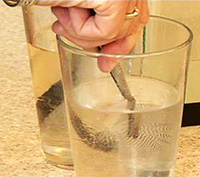Polymers for Environmental Remediation

The Deepwater Horizon oil spill demonstrated a key need for the development of environmentally friendly dispersants. In collaboration with Grayson, Reed, and Denslow, we are developing ‘concentration-independent’ dispersants that will not allow sequestered oil to be released in the infinite dilution of the ocean. Unimolecular micelles can be produced using a sacrificial nanoparticle scaffold of silica or lactose to afford hollow amphiphilic nanodispersants (HANDs). Our recent results have demonstrated the production and solution properties of HANDs, and we are currently exploring (1) additional nanoparticle scaffolds, (2) aquatic toxicity in both freshwater and seawater, and (3) fundamental design parameters and how they affect physiochemical and toxicological properties. In a separate project, we are studying the use of polymers to produce organogels. The goal is to develop a system that is able to convert spilled oil into a gel that can be physically removed from the suface of the water.
Previous research from the Savin Group in the area of Environmentally Friendly Polymers was cited by Rep. Welch (D-VT) in a speech to Congress.
